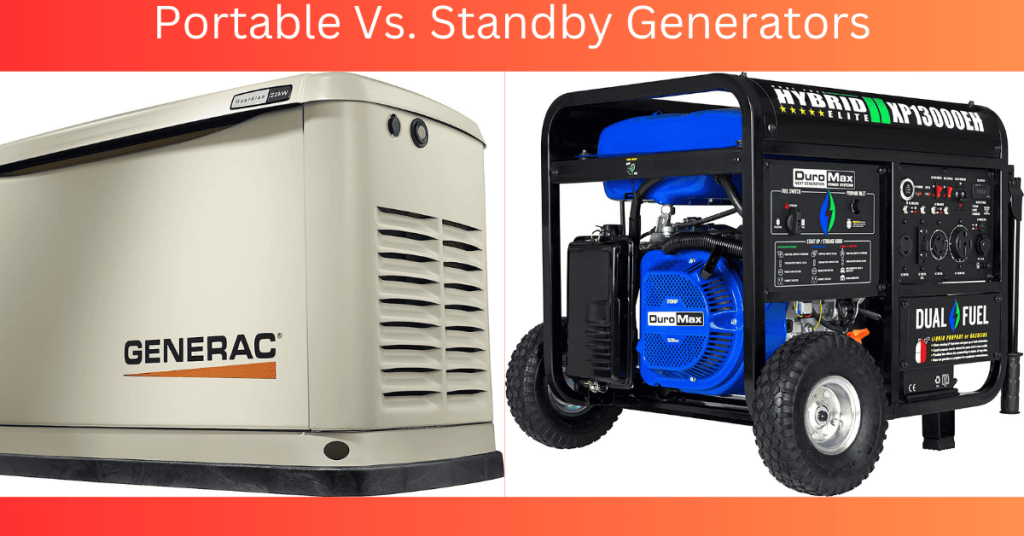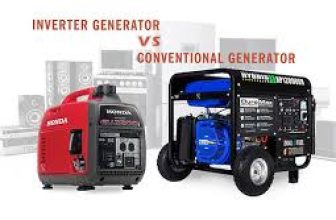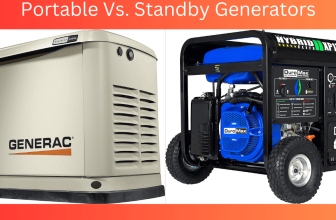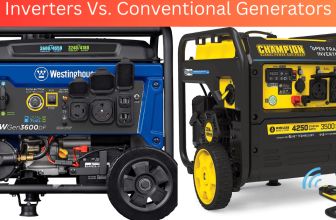When it comes to preparing for power outages, generators are a necessity. However, with so many options available, it can be overwhelming to choose the right one. That’s where we come in.
In this article, we’ll be diving into the battle of generators: standby versus portable, so you can make an informed decision and feel confident in your choice. As someone who values preparedness and self-sufficiency, I understand the importance of having a reliable backup power source.
Whether you’re facing a natural disaster, a power grid failure, or simply want to be prepared for unexpected blackouts, generators can provide peace of mind. But with so many options available, it’s important to understand the differences between standby and portable generators, as well as the advantages and disadvantages of each.
So let’s dive in and explore the world of generators together.
Key Takeaways
- Standby generators are more powerful and can provide power to an entire home, while portable generators are more affordable and mobile but have limited power output.
- Standby generators are installed permanently outside and run on natural gas or propane, while portable generators are easily moved and run on gasoline or diesel.
- Standby generators turn on automatically during power outages, while portable generators require manual setup and must be manually started and refueled.
- Considerations when choosing a generator include the risk of carbon monoxide poisoning, fuel availability, ease of use, mobility, capacity, cost, fuel type, and installation requirements.

Understanding the Differences between Standby and Portable Generators
So, you’re probably wondering what sets standby and portable generators apart from each other? Well, let’s start with the basics.
Standby generators are installed permanently outside your home or business, while portable generators can be easily moved around and used wherever you have access to power. Standby generators are also larger and more powerful, capable of providing power to your entire home or building during an outage, while portable generators typically provide power to a few appliances or tools at a time.
Another key difference between the two types of generators is their fuel source. Standby generators are typically powered by natural gas or propane, while portable generators run on gasoline or diesel. This means that standby generators can provide power for longer periods of time, as they are connected to a constant fuel source, while portable generators require refueling every few hours.
When it comes to noise level, standby generators are generally quieter than portable generators. This is because they are designed to be installed outside and away from living spaces, while portable generators are often used in close proximity to homes or businesses.
Now that we’ve covered the basics, let’s move on to a cost comparison between the two types of generators. While we won’t go into all the details just yet, it’s worth noting that cost is a major factor in deciding between a standby or portable generator. Standby generators are typically more expensive to purchase and install, but they offer the convenience of automatic power restoration and can provide power to your entire home or business. On the other hand, portable generators are more affordable and offer greater flexibility in terms of where and how they can be used. We’ll explore these cost differences in more detail in the next section.
Cost Comparison
So, when it comes to comparing the costs of standby and portable generators, there are three key points to consider: initial investment, maintenance costs, and fuel costs.
As for the initial investment, standby generators are typically more expensive than portable generators due to their larger size and more permanent installation. However, maintenance costs for standby generators are generally lower than for portable generators, which require more frequent servicing.
Additionally, fuel costs can be higher for standby generators since they typically run on natural gas or propane rather than gasoline, which is used by most portable generators.
Initial Investment
You’ll need to shell out a pretty penny upfront if you want a standby generator, but the peace of mind it provides is worth every cent. Standby generators are installed permanently and are connected to your home’s electrical system. They’re designed to turn on automatically when the power goes out and can power your entire home for days.
The initial investment for a standby generator can range from $5,000 to $15,000 depending on the size and features you choose. However, the convenience and security it provides during a power outage make it a worthwhile investment.
On the other hand, portable generators have a lower initial cost compared to standby generators. They can cost anywhere from $300 to $2,000, depending on the size and features, making them a more affordable option for many homeowners. However, it’s important to note that portable generators aren’t designed to power your entire home and may not be suitable for extended power outages. They require manual setup and must be manually started and refueled, which can be inconvenient during an emergency.
When it comes to the battle of generators, it’s important to consider not just the initial investment, but also the maintenance costs involved in keeping your generator in top condition.
Maintenance Costs
To keep your generator in good condition, you’ll need to budget for regular maintenance costs. These costs can vary depending on the type of generator you choose.
Standby generators typically require more maintenance due to their permanent installation and connection to your home’s electrical system. This includes regular inspections by a licensed technician, oil and filter changes, and battery replacements.
On the other hand, portable generators require less maintenance since they are only used when needed. However, you still need to perform routine maintenance such as oil changes, air filter replacements, and fuel stabilizer treatments.
It’s important to factor in maintenance costs when deciding between a standby and portable generator. While portable generators may have a lower initial investment, the ongoing maintenance costs can add up over time.
On the other hand, while standby generators may have a higher initial investment, their regular maintenance can help prolong their lifespan and save you from more costly repairs down the line.
Speaking of costs, let’s move on to the next important aspect of generator ownership: fuel costs.
Fuel Costs
Managing fuel costs is an essential aspect of owning a generator, as the price of fuel can fluctuate and impact the overall cost of running your generator. Standby generators typically run on natural gas or propane, which can be more expensive than gasoline, but they’re generally more fuel-efficient and offer a more stable fuel supply.
Portable generators, on the other hand, run on gasoline, which is cheaper but less efficient and requires more frequent refueling. To reduce fuel costs, it’s important to consider the fuel consumption rate of your generator and compare it to the cost of fuel in your area. Additionally, regular maintenance and proper usage can help improve fuel efficiency.
By monitoring fuel costs and implementing fuel-saving strategies, you can keep your generator running smoothly while minimizing the impact on your wallet. When it comes to convenience comparison, portable generators may seem like the more convenient option due to their portability, but standby generators offer the convenience of automatic power restoration in the event of an outage.
With this in mind, it’s important to weigh the benefits and drawbacks of each type of generator to determine which one best suits your needs and budget.
Convenience Comparison
When it comes to convenience, there are three main factors to consider: installation and setup, ease of use, and mobility.
First, when comparing standby and portable generators, installation and setup can be a major difference. Standby generators require professional installation and may require permits, while portable generators can be set up quickly and easily without any special requirements.
Second, ease of use can also vary between the two types of generators. Standby generators are automated and can turn on automatically in the event of a power outage, while portable generators require manual start-up and monitoring.
Finally, mobility is a key consideration for those who need power on the go or for those who don’t want a permanent fixture on their property. Portable generators can be easily moved to different locations, while standby generators are fixed in place.
Installation and Setup
Upon installation and setup, it’s crucial to consider the power requirements and fuel storage capacity for both standby and portable generators.
For standby generators, professional installation is recommended. They require a transfer switch which connects directly to the home’s electrical panel, ensuring a seamless transition of power in the event of an outage. Standby generators also require a reliable fuel source, such as natural gas or propane, which may require professional installation as well.
On the other hand, portable generators are much simpler to install and set up. They can be easily transported to the desired location and plugged into the necessary appliances using extension cords.
However, it’s important to note that portable generators should never be operated indoors or in enclosed spaces due to the risk of carbon monoxide poisoning. It’s also important to have enough fuel on hand to power the generator for the desired amount of time.
The ease of use for both types of generators will be discussed in the subsequent section.
Ease of Use
Using generators can be a breeze, especially if you know how to properly operate them and maintain their components. With portable generators, it’s relatively easy to get started. All you need to do is fill the fuel tank, flip a switch or pull a cord, and the generator will start running.
However, for standby generators, the process may be more complicated as they require professional installation and setup. Once they’re set up, they don’t require much maintenance, but it’s important to have a professional check them periodically to ensure they’re functioning properly.
In terms of ease of use, portable generators are more convenient as they can be easily moved around. They’re ideal for outdoor activities such as camping, tailgating, and backyard parties.
On the other hand, standby generators are stationary and are intended to provide backup power during an outage. They’re designed to automatically turn on whenever the power goes out and turn off when the power is restored.
In the next section, we’ll discuss mobility and how it affects the choice between standby and portable generators.
Mobility
You’ll find that the mobility of your generator can greatly impact its functionality, whether you need it for on-the-go power or as a stationary backup source. Here are some factors to consider when it comes to the mobility of generators:
- Weight: Portable generators are generally lighter than standby generators, which can weigh up to several hundred pounds. This makes them easier to move around, especially if you need to take them to different locations.
- Wheels: Some portable generators come with wheels, which makes them much easier to move around. Standby generators, on the other hand, are usually stationary and require professional installation.
- Handlebars: Many portable generators come with handlebars, which makes them even easier to move around. They can be easily lifted and transported, even by one person.
- Size: Portable generators are generally smaller than standby generators, which makes them easier to store and transport. They can be placed in the trunk of a car or in a storage shed, while standby generators require a dedicated space.
Considering these factors, it’s important to choose a generator that suits your mobility needs. However, it’s also important to keep in mind the capacity of the generator, which we’ll discuss in the next section.
Capacity Comparison
If you need to power multiple appliances during a power outage, a standby generator with a capacity of 20kW or higher may be a better option than a portable generator. Standby generators are designed to provide backup power for an entire home or business, while portable generators are typically used for smaller applications. The larger capacity of a standby generator makes it possible to run multiple appliances simultaneously without overloading the system.
To give you a better idea of the capacity differences between standby and portable generators, let’s take a look at this table:
| Generator Type | Capacity | Fuel Type |
|---|---|---|
| Standby | 20kW – 60kW+ | Natural Gas/Liquid Propane |
| Portable | 1kW – 10kW | Gasoline |
As you can see, the capacity of a standby generator is much higher than that of a portable generator. This means that a standby generator is better equipped to handle the demands of a larger home or business. Additionally, standby generators run on natural gas or liquid propane, which means they don’t require the same level of maintenance as gasoline-powered portable generators.
When choosing a generator, there are several factors to consider, including cost, fuel type, and installation requirements. We’ll delve deeper into these factors in the next section, but it’s important to keep in mind that the capacity of the generator is also a crucial consideration. By understanding the capacity differences between standby and portable generators, you can make an informed decision about which type of generator is best suited for your needs.
Factors to Consider when Choosing a Generator
Before making a decision on which generator to purchase, consider various factors that will have an impact on your long-term satisfaction with the generator’s performance.
One of the most important factors to consider is cost. Standby generators are generally more expensive than portable generators because they require professional installation, whereas portable generators can be purchased and set up easily by the homeowner. Additionally, standby generators often require regular maintenance and may have higher fuel costs.
Another factor to consider is fuel type. Standby generators typically run on natural gas or propane, which are cleaner burning and more efficient than gasoline or diesel. However, if you live in an area where natural gas or propane are not readily available, a portable generator that runs on gasoline or diesel may be a more practical option. Keep in mind that portable generators may have shorter run times and may require refueling more frequently.
Installation requirements are a crucial factor to consider when choosing a generator. Standby generators require professional installation and often require permits from your local government. Portable generators can be set up easily, but they must be used outdoors and kept away from any flammable materials. It’s important to determine the installation requirements for both types of generators and factor that into your decision-making process.
When considering all of these factors, it’s important to weigh the pros and cons of each type of generator to determine which one is right for your needs.
In the next section, we’ll discuss the advantages and disadvantages of standby generators.
Advantages and Disadvantages of Standby Generators
Now that we’ve covered the important factors to consider when choosing a generator, let’s dive into the advantages and disadvantages of standby generators.
First off, standby generators are designed to turn on automatically when the power goes out, making them incredibly convenient and reliable. You don’t have to worry about manually starting it or running out of fuel. Standby generators are also capable of powering your entire home, so you can continue to use all of your appliances and devices during an outage.
However, standby generators also come with a higher price tag and require professional installation. They also require regular maintenance to ensure they are functioning properly. It’s important to consider these factors before investing in a standby generator.
Moving on, let’s take a look at the advantages and disadvantages of portable generators. [Sentence transition into subsequent section]
Advantages and Disadvantages of Portable Generators
Let’s explore the pros and cons of using a portable generator in your home. Portable generators are a great option for those who need power on-the-go or during an emergency.
One of the biggest advantages of a portable generator is its mobility. You can easily move it around and use it wherever you need power. They’re also more affordable than standby generators, making them a popular choice for those on a budget.
However, there are also some disadvantages to using a portable generator. One of the biggest drawbacks is their limited power output. Most portable generators can only power a few appliances at a time, so you’ll need to prioritize which ones are most important.
They also require manual operation, which means you’ll need to fill them with gasoline, start them up, and monitor them while they’re running. Another disadvantage of portable generators is their noise level. They can be quite loud, which is not ideal if you’re trying to sleep or work from home.
Additionally, they emit carbon monoxide, which can be dangerous if the generator is not placed in a well-ventilated area. It’s important to follow safety guidelines when using a portable generator to avoid any accidents or harm to yourself or others.
Overall, portable generators can be a great option for those who need power on-the-go or during an emergency. They’re affordable and mobile, but they do have limited power output and can be noisy and emit carbon monoxide. It’s important to weigh the pros and cons and follow safety guidelines when deciding if a portable generator is the right choice for you.
Frequently Asked Questions
Are there any safety hazards associated with using either a standby or portable generator?
Using a generator can be hazardous if not used properly. Carbon monoxide poisoning is a leading cause of death. To avoid this, keep generators outside and away from windows.
How do I properly maintain and store my generator when not in use?
To keep our generator in good condition, we store it in a dry, well-ventilated area and inspect it regularly for any damage or wear. We also change the oil and fuel filters annually, and run it periodically to keep it functioning properly.
Can a generator be used to power an entire house, or are there limitations to its capacity?
Yes, a generator can power an entire house, but its capacity may be limited. It’s important to calculate the wattage needed and choose a generator that can handle it. Regular maintenance and fuel management are also crucial for optimal performance.
Will a generator work in extreme weather conditions, such as heavy rain or snow?
Yes, generators can work in extreme weather conditions, but precautions must be taken. Regular maintenance, proper fuel storage, and weatherproofing are crucial to ensure reliable operation. We’ve learned this through experience.
Are there any legal regulations or permits required for using a generator in my area?
Oh, the joys of bureaucracy! Yes, there may be legal regulations or permits required for using a generator in your area. It’s best to check with your local government and ensure compliance before firing up that engine.
Conclusion
In conclusion, choosing between a standby and portable generator depends on several factors. While standby generators are more expensive, they offer a higher capacity and added convenience as they automatically turn on in the event of a power outage.
On the other hand, portable generators are more affordable and can be moved around easily, but they may not have enough capacity to power an entire house. Ultimately, it all comes down to personal preference and specific needs.
If you live in an area prone to frequent power outages, a standby generator may be the best option for you. However, if you only need a backup power source for occasional use or want something that can be easily transported, a portable generator may be the better choice.
Whichever option you choose, make sure to consider all the advantages and disadvantages before making your final decision.





